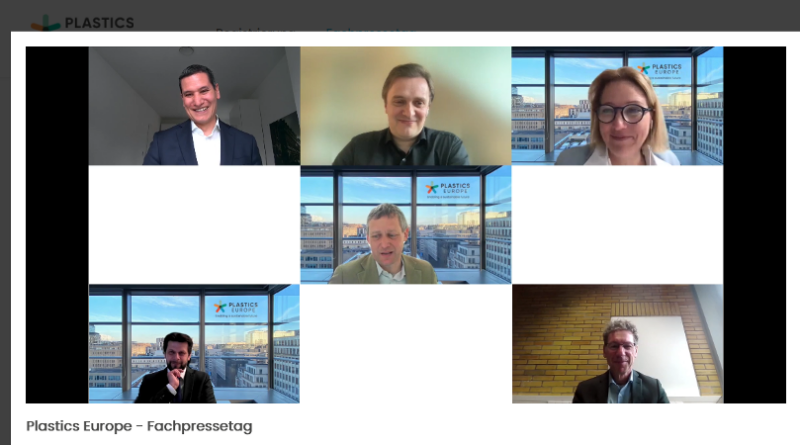Plastics Europe Trade Press Conference – Focus on Circular Economy
Every year Plastics Europe Germany, the association of plastics producers, holds its trade press day, usually right around the beginning of spring. And so it was again this year. Around two dozen participants across the trade press found their way digitally to an exciting event on 15 March 2022, where (almost) everything revolved around the climate-neutral circular economy.
Almost everything, because Ingemar Bühler (photo top left), CEO of Plastics Europe Germany and host of the event, also began by saying a few words about Putin’s invasion of Ukraine, which of course could not go unmentioned – not only for reasons of the impact on supply chains and co – could not remain unmentioned. A turning point in time, which also illustrates how important it is that our industry follows the path of decoupling from fossil raw materials more consistently and courageously, and that resources are circulated more efficiently overall.
Dr Henning Wilts (photo top centre), head of the circular economy department at the Wuppertal Institute, kicked off the day with his presentation “Climate-neutral industry? Circular economy as a key strategy”. In addition to the enormous opportunities, he also emphasised how difficult the path to this goal still is – despite excellent theoretical debate, criteria catalogues and innovative research projects. At the moment, Dr Wilts explained, there is simply too little being implemented. In the context of a sharp increase in total resource consumption worldwide, which is causing high CO2 emissions and massive species extinction, it is high time to get down to implementation.
This is where Sabine Nadherny-Borutin (photo top right), Secretary General of PlasticsEurope Austria, picked up. In particular, she presented the Austrian initiative Carbon Cycle Circle, which consists of companies in the sector, research institutions and plastics think tanks. Together, these players contribute as a network to the discussions on the circular economy, climate neutrality and resource conservation and, due to their expertise, can also develop concrete proposals and concepts vis-à-vis government and co. to strengthen the circular economy already today – and, as Dr Wilts urged, to get straight down to implementation
The third speaker was Dr Alexander Kronimus (photo bottom left), Head of the Climate Protection and Circular Economy Division at the Plastics Producers Association, who addressed the representatives of the trade press. In his presentation, Dr Kronimus introduced the circular technologies that are to make the climate-neutral circular economy around plastics a reality. Away from fossil fuels and towards a circular economy: these two goals could be achieved simultaneously, for example by producing plastics with CO2, which is thus bound in plastics and no longer released into the atmosphere. Plastics made from biomass, especially from bio-residues such as organic waste, could also contribute equally to these two goals. According to Dr Kronimus, the circular technology of recycling is of course also essential. In concrete terms, this would involve the further development of mechanical recycling as well as large-scale plants for chemical recycling.
Prof. Dr Dieter Stapf (photo bottom right) from KIT Karlsruhe showed that this chemical recycling is often underestimated and that this recycling method is wrongly assumed to consume much more energy than is actually the case. In order to achieve the recycling targets, there is an additional need for 11 million tonnes of plastic waste in the EU by 2030. These quantities cannot be achieved with mixed plastic waste and mechanical recycling alone. Chemical recycling, on the other hand, enables much more comprehensive recycling with relatively little energy input – a small portion of plastic waste (mid-single digits) is already sufficient for energy generation. It is more difficult to achieve the high temperature level and for this, large-scale plants with a permanently high material turnover are now finally needed.

